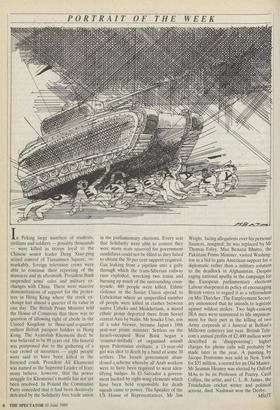PORTRAIT OF THE WEEK
In Peking large numbers of students, civilians and soldiers — possibly thousands — were killed as troops loyal to the Chinese senior leader Deng Xiao-ping seized control of Tiananmen Square; re- markably, foreign television crews were able to continue their reporting of the massacre and its aftermath. President Bush suspended arms' sales and military ex- changes with China. There were massive demonstrations of support for the protes- ters in Hong Kong where the stock ex- change lost almost a quarter of its value in one day. The British Prime Minister told the House of Commons that there was no question of allowing right of abode in the United Kingdom to three-and-a-quarter million British passport holders in Hong Kong. The Ayatollah Khomeini died; he was believed to be 89 years old. His funeral was postponed due to the gathering of a vast crowd of mourners — eight people were said to have been killed in the frenzied crush. President Ali Khamenei was named as the Supreme Leader of Iran; many believe, however, that the power struggle for Khomenei's mantle has not yet been resolved. In Poland the Communist Party conceded that it had been decisively defeated by the Solidarity free trade union
in the parliamentary elections. Every seat that Solidarity were able to contest they won; many seats reserved for government candidates could not be filled as they failed to obtain the 50 per cent support required. Gas leaking from a pipeline into a gully through which the trans-Siberian railway runs exploded, wrecking two trains and burning up much of the surrounding coun- tryside; 460 people were killed. Ethnic violence in the Soviet Union spread to Uzbekistan where an unspecified number of people were killed in clashes between native Uzbeks and Meskhetians, a mixed ethnic group deported there from Soviet central Asia by Stalin. Mr Sosuke Uno, son of a sake brewer, became Japan's 18th post-war prime minister. Settlers on the Israeli-occupied West Bank began a `counter-intifada' of organised assault upon Palestinian civilians; a 13-year-old girl was shot to death by a band of some 30 settlers. The Israeli government aban- doned a scheme whereby all Arab workers were to have been required to wear iden- tifying badges. In El Salvador a govern- ment backed by right-wing elements which have been held responsible for death squads came to power. The Speaker of the US House of Representatives, Mr Jim Wright, facing allegations over his personal finances, resigned; he was replaced by Mr Thomas Foley. Miss Benazir Bhutto, the Pakistani Prime Minister, visited Washing- ton in a bid to gain American support for a diplomatic rather than a military solution to the deadlock in Afghanistan. Despite raging national apathy in the campaign for the European parliamentary elections Labour sharpened its policy of encouraging British voters to regard it as a referendum on Mrs Thatcher. The Employment Secret- ary announced that he intends to legislate against wildcat strikes. Two high-ranking IRA men were sentenced to life imprison- ment for their part in the killing of two Army corporals at a funeral at Belfast's Milltown cemetery last year. British Tele- com's annual profits of £2,400 million were described as `disappointing'; higher charges for phone calls will probably be made later in the year. A painting by Jacopo Pontormo was sold in New York for $35 million, a record for an Old Master. Mr Seamus Heaney was elected by Oxford MAs to be its Professor of Poetry. Cecil Collins, the artist, and C. L. R. James, the Trinidadian cricket writer and political activist, died. Nashwan won the Derby.
MStJT


























































 Previous page
Previous page